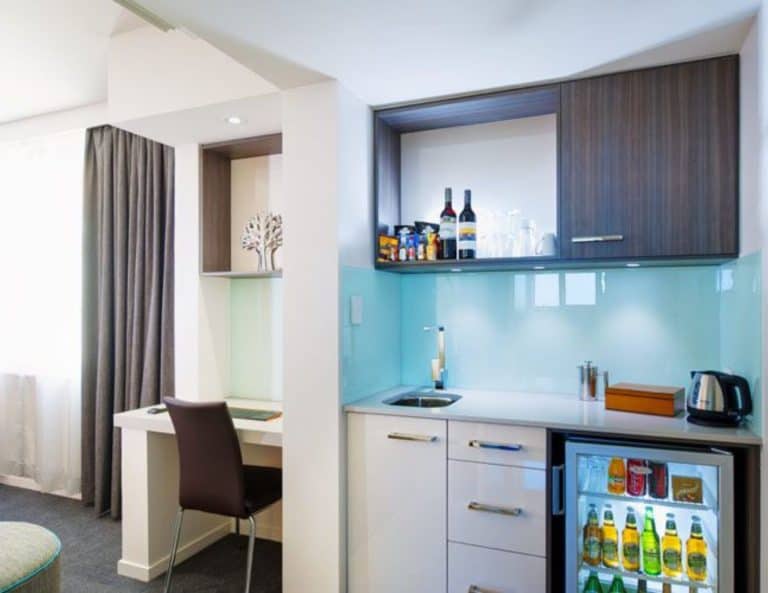Are you planning a hotel stay and wondering what the term ‘high floor’ means? If so, you’re in the right place!
If you’re short on time, here’s a quick answer to your question: a high floor in a hotel typically refers to a room located on one of the uppermost levels of the building.
In this comprehensive guide, we’ll dive deeper into what constitutes a high floor, the benefits and drawbacks of staying on one, and how to request a high floor when booking your stay.
What is Considered a High Floor in a Hotel?
When booking a hotel room, one of the options that guests can choose is a high floor. But what exactly does high floor mean in a hotel? Generally, a high floor is considered to be any floor above the 6th level of a building. However, this can vary depending on the specific hotel and location.
Defining High Floor
As mentioned, a high floor can vary depending on the hotel and location. For example, a hotel in a densely populated city may consider the 10th floor to be a high floor due to the number of buildings in the area. On the other hand, a hotel in a rural area may consider the 3rd floor to be a high floor due to the lack of tall buildings in the vicinity.
Generally, hotels will specify the floor range that they consider to be high on their website or booking platforms. It is worth mentioning that some hotels may charge a premium for high floors due to the better views and potential noise reduction.
Factors That Determine What is Considered High
Several factors can determine what a hotel considers to be a high floor. Here are some of the most common:
- The height of the building: The taller the building, the higher the floor range that may be considered high.
- The location of the hotel: As mentioned, a hotel’s location can impact what floor range is considered high.
- The view: If a hotel has a particularly good view from higher floors, they may consider those floors to be high.
- The noise level: In some cases, higher floors may be considered high because they are further away from street-level noise.
It is also important to keep in mind that some hotels may have specific room types designated for high floors, such as executive suites or penthouses. These rooms may have additional amenities or features that make them more desirable for guests.
Remember, the definition of a high floor can vary depending on the hotel and location. If having a high floor is important to you, be sure to check with the hotel directly to confirm what floor range they consider to be high.
Benefits of Staying on a High Floor
Staying on a high floor in a hotel has its perks. Here are some of the benefits of choosing to stay on a high floor:
- Better Views: One of the most obvious benefits of staying on a high floor is the spectacular view. The higher the floor, the more extensive and panoramic the views of the surrounding area become. Whether it’s the stunning city skyline or the tranquil ocean view, the view from a high floor can be breathtaking and worth the extra cost.
- Less Noise: Staying on a high floor can mean less noise. Being situated on a higher floor ensures that guests are further away from street-level noise, foot traffic, and other distractions. This can be especially important when trying to get a good night’s sleep or when working in your room.
- More Privacy: High floors are often less frequented by hotel staff and other guests. This can provide guests with a sense of privacy and exclusivity. Additionally, high floors typically have fewer rooms, which means fewer guests walking by your room, resulting in less noise and more privacy.
It is worth mentioning that higher floors do come with some potential downsides. For example, guests with a fear of heights may not enjoy staying on a high floor. Additionally, elevators can be more crowded on higher floors, which may lead to longer wait times.
Drawbacks of Staying on a High Floor
While staying on a high floor of a hotel can offer breathtaking views and a sense of exclusivity, there are some drawbacks to consider before booking that room. It is worth mentioning that these drawbacks may vary depending on the hotel’s location and amenities.
Longer Elevator Waits
One of the most common drawbacks of staying on a high floor is longer elevator waits. On the other hand, guests who stay on lower floors may have faster and easier access to the lobby, restaurants, and other amenities. Unfortunately, this could mean that high-floor guests may have to wait for several minutes for the elevator to arrive, especially during peak hours. Keep in mind that some hotels have separate elevators for high floors to alleviate this issue, but it is always best to check with the hotel before booking.
Higher Prices
Another drawback of staying on a high floor is that it may come with a higher price tag. Based on Quora, hotel rooms on higher floors can cost up to 50% more than rooms on lower floors. This is because of the added amenities and views that come with high-floor rooms. If budget is a concern, it may be best to opt for a lower floor room.
Less Accessibility
Finally, guests staying on high floors may experience less accessibility. For example, guests with mobility issues may find it difficult to climb stairs or walk long distances to their room. Additionally, high-floor rooms may be less accessible in case of an emergency, such as a fire. It is worth noting that some hotels offer accessible high-floor rooms with special features such as wider doorways, grab bars, and roll-in showers, but it is always best to check with the hotel before booking.
Tips for Requesting a High Floor
Staying on a high floor in a hotel can have a number of benefits, such as better views, less noise pollution and improved safety. However, not all hotels have high floors and it is important to know how to request one if it is a priority for your stay.
When to Request
It is worth mentioning that it is best to request a high floor as early as possible during the booking process. This will give the hotel staff more time to accommodate your request. Keep in mind that high floors are usually in high demand, especially during peak travel times.
How to Request
When making a booking, you can add a request for a high floor in the “special requests” section of the booking form. You can also contact the hotel directly to make the request. It is important to remember that a high floor request is not a guarantee and availability cannot be guaranteed.
Other Room Preferences to Consider
If a high floor is not available, there are other room preferences to consider that can improve your stay. For example, a room at the end of the hallway may be quieter and have less foot traffic. A room away from the elevator may also be less noisy. Additionally, a room with a view of the hotel pool or garden can also enhance your stay.
| High Floor vs Low Floor | |
|---|---|
| Benefits | High Floor: Better views, less noise pollution, improved safety |
| Low Floor: Easier access to amenities, less waiting time for elevators | |
| Considerations | High Floor: May be more expensive, not available in all hotels, not suitable for those with a fear of heights |
| Low Floor: May be noisier, less privacy, may have limited views |
It is important to keep in mind that while a high floor can offer many benefits, it may not be the best option for everyone. Some people may prefer a lower floor for easier accessibility to amenities or due to a fear of heights. Ultimately, it is important to communicate your preferences to the hotel and make the best decision for your stay.
Conclusion
If you are someone who enjoys a good view and wants to avoid the noise and chaos of the street level, then choosing a room on a high floor might be the right choice for you. On the other hand, if you are someone who prefers to be closer to the action and amenities of the hotel, then a lower floor might be a better option.
At the end of the day, the decision to stay on a high floor ultimately comes down to personal preference. However, by keeping the information in this guide in mind, guests can make informed decisions and ensure that their hotel stay is as enjoyable as possible.






